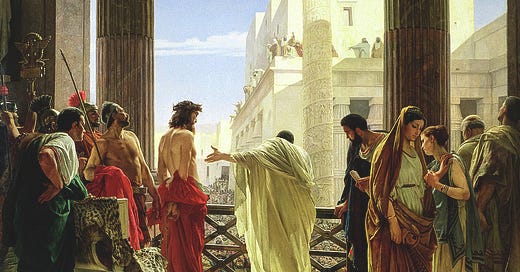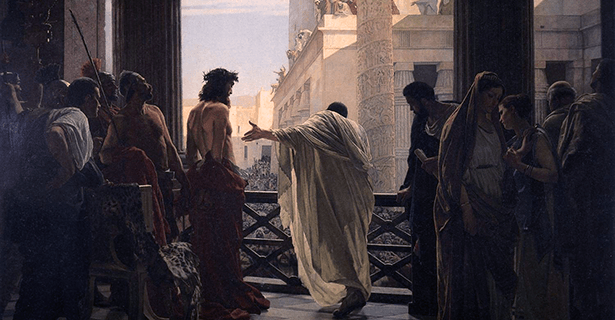“So, you are a king then?” (John 18:37)
I find the conversation between Pontus Pilate and Jesus to be one of the most amazing conversations in the Scriptures. That was the moment, from an earthy perspective, where Jesus’ fate was decided. That was the moment that the judgment of man came on the Son of Man. That was where the final verdict of the people came down on the head of Christ. But instead of a crown of laurels, the mob has decided on a crown of thorns.
The Judgement Seat of Pilate
I find it compelling to think about the scene there in Pilate’s palace. The crowd outside is loud, but the marble-covered walls and floors muffle the exterior noise. Pilate talks to Christ privately, hoping that this Jesus will drop the facade that he assumes that he is putting up, and talk man to man. But with Jesus, there is no public image. There is no PR department. And when Pilate and Jesus finally do get to talk privately, when they do talk man-to-man, Pilate quickly gets the sense that they are talking God-to-man, and Pilate is not the god.
Even though he ultimately sends Jesus to be executed, he does so with hesitation. Pilate’s perspective toward Jesus can be summarized as perplexed. Pilate understands authority. He understands hierarchy, and his own place as a representative of the Roman State, charged to keep the peace. But he cannot understand the Authority of Heaven standing before him. He cannot understand how the Head of all rule and authority can be crowned with thorns instead of gold. He cannot understand the Prince of Peace as he hears the pulsing cry of the crowd outside the walls of his palace, chanting, “Crucify Him!”
Pilate’s short, curt questions show his consternation. Pilate is clearly disquieted. He is unsettled about the Man standing before him, who says His kingdom is not from this world. He is unsettled like a man who stares into the night sky, and senses his own dependency on the divine. Pilate is unsettled because, although Jesus is physically standing before Pilate, Pilate feels that he is the one on trial. Pilate asks Him, “You are a king then?”. You are a king then. Jesus’ reply is one He has used through all of his trial. He says, “You say that I am”, an equivalent to, “Yes, what you just said.” There is an authority and finality to Christ’s words. Pilate would be accustomed to criminals that were either out of their minds or demon possessed. He would have been accustomed to prisoners groveling before him in fear of execution. But Pilate would not expect a Man who, in his right mind, tells Pilate that he has no authority over Him that God has not given.
Pilate asks Jesus, “What is truth?”, not recognizing that the Way, the Truth, and the Life was in bonds standing before him. After a point, Pilate has nothing else to say. He must shut his mouth, fulfilling the prophecy of Isaiah, “kings shall shut their mouths because of Him…” (Isaiah 52:15). Jesus told Pilate, “I came into the world…” Not “I was born one day, and want to do such and such thing”, but rather, “I came to do such and such.” The Son of God, eternally begotten of the Father, True God of True God, is the only one who chose to be born. “The light shines in the darkness, and the darkness,” both the Pharisees and Pilate, did “not comprehend it” (John 1:5).
The Irony of Pilate’s Words
It may be that Pilate wrote the inscription on top the cross, “Jesus of Nazareth, King of the Jews” in pure mockery. But there is an other-worldly irony that the entire world should receive the news of Christ’s kingship via that wooden placard.
In Latin, the language of the occupying Romans
IESVS NAZARENVS REX IVDÆORVM
In Greek, the lingua franca of the Mediterranean world,
Ἰησοῦς ὁ Ναζωραῖος ὁ βασιλεύς τῶν Ἰουδαίων
And in Hebrew, the language of the Jewish people,
ישוע מנצרת ומלך היהודים
It is stranger still that, when the Jewish leaders demand that the sign be changed to say that, “this man claimed to be the king of the Jews,” Pilate refuses. Why should he refuse this revision? He says, “I have written what I have written.” This may have been Pilate being an obstinate man, but I believe that his refusal to change the sign was on account of the meeting that this governor of Judea had in his palace with the Lord of Lord. He could not “according to the definite plan and foreknowledge of God (Acts 2:23)” change what had been written. It was determined that, in mockery in jest, the Savior of the world would be proclaimed to the nations. Even in Pilate’s ridicule of the Truth, he announces it.
The Judgement Seat of Christ
There is a day on which Pilate will stand before the Judgment Seat of Christ, along with you and I, dear reader. There is a day where the one who sent the Son of God to the cross will be made to go wherever the Son of God sends him.
The one who was judged by Pontus Pilate will judge the whole world. Pilate “brought Jesus out and sat down on the judgment seat” (John 19:13), but himself will be brought by the angels of God to the Final Judgement. Pilate will stand before the throne from which “heaven and earth flee…and no place [is] found for them” (Revelation 20:11).
And, as the hymn writer wrote,
“The head that once was crown’d with thorns is crown’d with glory now.”





WOW!!! This blew my mind and made this scene so real to me.
Well written. Pilate was in a pickle as the Jews reminded him. If he let Jesus go, "he was no friend of Ceasar." He was being reminded that invitations to the cool cocktail parties only go to loyal members of the team. Really, nothing has changed in 2000 years. We bow to Ceasar or we bow to God.
What is Truth?